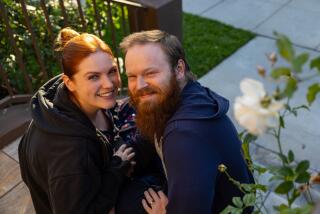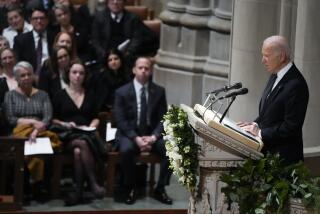Mother’s Harvard Goal vs. Father’s Rights
- Share via
When Gina Ocon entered Harvard University on a full scholarship three years ago, she felt secure enough to map out the rest of her life: an Ivy League degree, law school, a job in international relations and, one day, an ambassadorship.
Today, at 21, Ocon is a single mother in Lakewood, relying on a welfare check. Trapped on the fault line between the feminist and fathers rights movements, she wants to return to Cambridge with her 10-month-old baby; the scholarship she earned is still valid. But she is stuck here until she resolves a child custody battle with her ex-boyfriend.
Tommaso Maggiore, 21, contends that the rigors of the Ivy League would make Ocon an inattentive mother and force her to “warehouse” their daughter, Bailey, in day care. He wants a custody-sharing arrangement that would keep the child--and Ocon--in Southern California. And, he argues, his family, which owns the popular Andiamo restaurant in Long Beach, could help raise the child.
Ocon insists that she could juggle the demands of her books and her child. She expects to send Bailey to day care for about 30 hours a week, but says that should not count against her. By earning a Harvard degree, she says, she would be helping--not hurting--her child’s future.
Long Beach family law Commissioner John Chemeleski is set to decide the case May 6. His ruling must take into account several wrenching issues now facing family law courts: the mobility of parents in contemporary society, a single mother’s right to the education of her choice, a single father’s right to participate in raising his child, the relative merits of day care.
*
Now living with her mother in Lakewood and collecting a $453 monthly check from Aid to Families With Dependent Children, Ocon regrets what she calls the “summer fling” that led to her pregnancy. The question now is how much it will cost her.
The law requires that Chemeleski’s decision be based on the best interests of the child, Bailey Marie Theresa Maggiore, a giggly girl with a shock of blond hair and a fascination with toothbrushes. In effect, the commissioner will also decide whether Ocon will be able to reclaim her deferred dream.
“I feel like I have a right to go back to Harvard. I’m not a teenage statistic,” Ocon said.
Maggiore and Ocon broke up in September, when their baby was 3 months old.
A waiter at his parents’ Long Beach restaurant, Maggiore said he takes home $700 to $800 a month and could, with the help of his family, provide a healthy environment for his daughter. He said he hopes one day to earn a business degree, although he has twice dropped out of Long Beach City College without completing a semester. He is now enrolled again.
The last thing he wants is to keep Ocon from an education, he said. But he insists that she could not raise Bailey on her own, 3,000 miles from home.
“The school that she’s going to demands that you put 100% into school,” he said. “I don’t think she’d be able to handle it as well as if she had family support back over here. I really don’t think she would be capable of doing it.”
Ocon’s response: “Watch me.”
Born to a mother who was just 17 at the time, Ocon learned early that children of young, single parents too often become young, single parents themselves. Her mother hastily married her father only to divorce four years later.
*
Ocon told herself she wouldn’t end up in the same bind. At the Catholic schools she attended for most of her life, she dedicated herself to her studies, graduating from high school with a 3.9 grade-point average.
“I’ll be smarter,” she recalled telling herself whenever friends tried to tempt her with alcohol, drugs or too much partying. “For a long time, I was smarter.”
Smart enough to win admission to Harvard, Yale, Princeton and the Air Force Academy. She chose Harvard and headed off to her first semester with a $29,000 annual scholarship package in the fall of 1994.
She joined the model legislature and the crew team. She worked at the American Repertory Theater. And she earned about a 3.5 grade-point average.
“The entire year, I was in control of my destiny,” she said. “There was absolutely nothing that could get in my way. I had to get humbled again.”
When she returned home for the summer, she ran into Maggiore, until then only an acquaintance.
They seemed a picture-perfect couple. She had been a beauty contest runner-up; he was the well-dressed, handsome heir to a thriving family business. They spent the summer of 1995 on the town, popping into local dance clubs, lounging at the beach and cruising on Maggiore’s motorcycle.
Her mother did not approve.
When Ocon returned to Cambridge in the fall, she discovered she was pregnant. The couple wrestled with their choices: marriage, adoption, abortion.
Ocon had opposed abortion for years, in part, she said, because of her Catholic school education. But suddenly she found herself having doubts.
“I can understand some motivation to be pro-choice,” she allows now. She explained her change in perspective this way: “You’re a dumb kid. And then something happens. And you become less judgmental. Why did you let this happen to you? I have to keep reminding myself I’m human.”
Ocon eventually decided to take a year off school to have the baby and return the following fall. The couple lived with Maggiore’s parents for a few months before their daughter was born June 17, 1996.
Six weeks later, the new family flew back to Cambridge, where Maggiore applied for a job at one of Harvard’s exclusive eating clubs.
The couple researched day-care centers. They had hoped to sign up for campus housing. But they were too late--the most affordable apartments were already taken. Reluctantly, they decided to put off their plans for another year.
Back in Long Beach, their relationship began showing signs of wear. In September, after a series of quarrels, Ocon walked out and took Bailey with her. Three days later, Maggiore filed for custody.
Ocon, who is seeking child support, now has temporary custody and is the child’s primary caretaker. The couple has agreed that Maggiore can take the child about four hours a day, twice a week.
But the details of a permanent arrangement must be worked out by the court. California family law encourages custody arrangements that allow a child to have “frequent and continuous” contact with both parents, although that term has yet to be defined.
In Ocon’s case, two earlier decisions are likely to be important factors in the calculus of what constitutes Bailey’s best interests, legal experts say.
A 1986 California Supreme Court decision--Burchard vs. Garay--held that a custody finding must reflect “a factual determination of how best to provide continuity of attention, nurturing and care. It cannot be based on an assumption . . . that a working mother cannot provide such care.”
And, in a decision last year, the high court ruled in Burgess vs. Burgess that the “ordinary needs” of both parents to pursue educational or career opportunities make it “unrealistic” for courts to exert pressure on them to remain in the same place.
*
Even fathers’ rights advocates say that Ocon will probably benefit if Chemeleski bases his decision on those precedents. The fact that Ocon has been the child’s primary caretaker will also carry some weight, they say.
But the legal climate for so-called “move-away” cases, particularly those involving long-distance relocations, is still uncertain.
“There are some open questions about the relevance of easy visitation to child custody decisions,” said USC family law expert Scott A. Altman. “On one reading, Burgess declares that the desire to move away, even at some distance, should not undermine a custodial parent’s entitlement to custody. At the same time, Burgess emphasizes trial court discretion, which might, in the long term, mean that trial courts inclined to restrict long-distance moves would have discretion to do so. There’s a real long-term ambiguity.”
Still fresh in the minds of family law experts and parents’ rights advocates is the case of Jennifer Ireland. As a 19-year-old mother, Ireland moved from her home in suburban Detroit in 1993 to attend classes at the University of Michigan in Ann Arbor, 36 miles away. There she put her 3-year-old daughter in day care for 35 hours a week.
A judge ruled that Ireland’s academic work “necessitates the leaving of the child for a considerable portion of its life in the care of strangers,” and awarded custody to the child’s 20-year-old father. He had argued that his own mother, a homemaker, could better raise the child.
After a two-year legal battle, the couple agreed to share custody, splitting weekends, holidays and summers. Ireland dropped out of college to return to the Detroit area to be closer to her daughter.
At Harvard, officials estimate that of 6,500 undergraduates, 12 are raising children while working toward a degree, as Ocon hopes to do.
“People doing that feel very stretched,” said Thomas Dingman, an associate dean for support services. “They have to be much more disciplined. But we’ve had some people do it and achieve great success.”
*
He cited the example of a woman who cared for her 6-year-old child, held down a job doing research for a faculty member and last year graduated with honors.
And, in Ocon’s case, Harvard has offered to pay medical benefits for Bailey. Ocon said that with the resources available at Harvard and with the help of friends in the Northeast, she could balance the competing demands of her classes and her child.
Under a visitation agreement suggested by Ocon, Maggiore would have contact with the child during summer vacation and other breaks.
While Maggiore expresses doubts about Ocon’s ability to manage her classes and child care, she points out that Maggiore is less than a model of responsibility.
Maggiore was arrested twice in December, once on suspicion of driving under the influence of alcohol after he crashed into a parked police car, and once on suspicion of public intoxication after police found him passed out in his car at 5 a.m. He says he was “in the wrong place at the wrong time.”
For the time being, the couple have reached a tenuous detente, crossing paths two or three times a week so that Maggiore can take the baby.
“I’m at an impasse,” Ocon said. “I feel like I’m being penalized--not for having the baby--but for not having the resources to break myself out of this confinement. I’ve never felt so dependent before. It’s up to the court to decide what my future’s going to be.”
More to Read
Sign up for Essential California
The most important California stories and recommendations in your inbox every morning.
You may occasionally receive promotional content from the Los Angeles Times.










